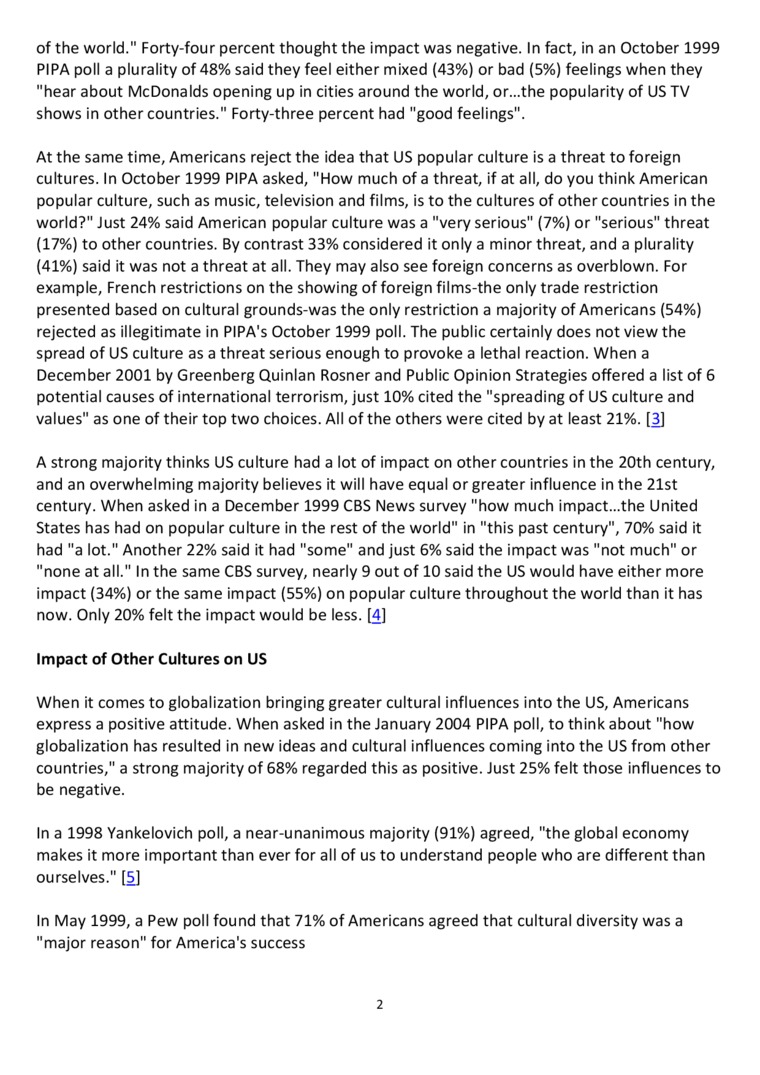107786

of the world." Forty-four percent thought the impact was negative. In fact, in an October 1999 PIPA poll a plurality of 48% said they feel either mixed (43%) or bad (5%) feelings when they "hear about McDonalds opening up in cities around the world, or...the popularity of US TV shows in other countries." Forty-three percent had "good feelings".
At the same time, Americans reject the idea that US popular culture is a threat to foreign cultures. In October 1999 PIPA asked, "How much of a threat, if at all, do you think American popular culture, such as musie, television and films, is to the cultures of other countries in the world?" Just 24% said American popular culture was a "very serious" (7%) or "serious" threat (17%) to other countries. By contrast 33% considered it only a minor threat, and a plurality (41%) said it was not a threat at all. They may also see foreign concerns as overblown. For example, French restrictions on the showing of foreign films-the only trade restriction presented based on cultural grounds-was the only restriction a majority of Americans (54%) rejected as illegitimate in PIPA's October 1999 poll. The public certainly does not view the spread of US culture as a threat serious enough to provoke a lethal reaction. When a December 2001 by Greenberg Quinlan Rosner and Public Opinion Strategies offered a list of 6 potential causes of international terrorism, just 10% cited the "spreading of US culture and values" as one of their top two choices. All of the others were cited by at least 21%. [3]
A strong majority thinks US culture had a lot of impact on other countries in the 20th century, and an overwhelming majority believes it will have equal or greater influence in the 21st century. When asked in a December 1999 CBS News survey "how much impact...the United States has had on popular culture in the rest of the world" in "this past century", 70% said it had "a lot." Another 22% said it had "some" and just 6% said the impact was "not much" or "nonę at all." In the same CBS survey, nearly 9 out of 10 said the US would have either morę impact (34%) or the same impact (55%) on popular culture throughout the world than it has now. Only 20% felt the impact would be less. [4]
Impact of Other Cultures on US
When it comes to globalization bringing greater cultural influences into the US, Americans express a positive attitude. When asked in the January 2004 PIPA poll, to think about "how globalization has resulted in new ideas and cultural influences coming into the US from other countries," a strong majority of 68% regarded this as positive. Just 25% felt those influences to be negative.
In a 1998 Yankelovich poll, a near-unanimous majority (91%) agreed, "the global economy makes it morę important than ever for all of us to understand people who are different than ourselves." [5]
In May 1999, a Pew poll found that 71% of Americans agreed that cultural diversity was a "major reason" for America's success
2
Wyszukiwarka
Podobne podstrony:
307 (31) 279 Buttons other side of the garment - was recognised in the pieces of 14th-century clothi
tup 2 • ‘Brian Aldiss uses every trick of the science fiction trade in an erotic and neatly-plotted
img015 being translated into English. However, a video of the exercises was released in English in 1
and practice has become one of the most widespread slogans in the present-day world, where it is bei
Uou are one of the most GUTE persotis in the World!! Just a second, dorit misunderstan d. CUTE
Slajd56 Bielactwo Fig. 1.3-2.8 Bila te rai segmental vitiligo of the same distri>ution in Asian{a
Slajd56 Bielactwo Fig. 1.3-2.8 Bila te rai segmental vitiligo of the same distri>ution in Asian{a
84 B. Michalec The dccrcase the conveyance of studied section of the channel R was affmned, i.e. fro
i * i * signs. or complexes of symptoms and signs. The “diagnoses** of the screening method use
więcej podobnych podstron